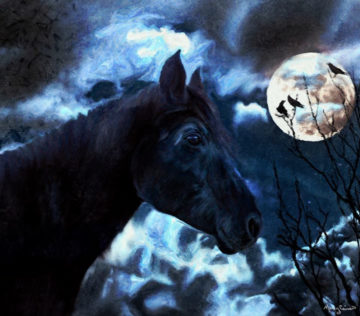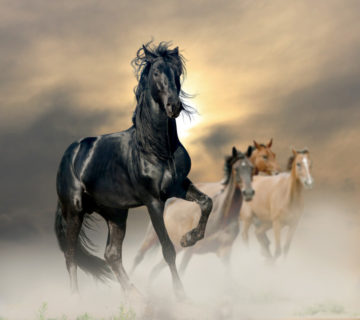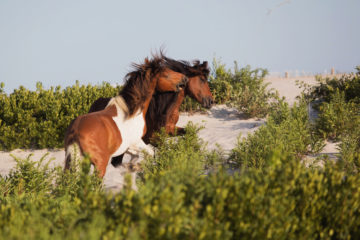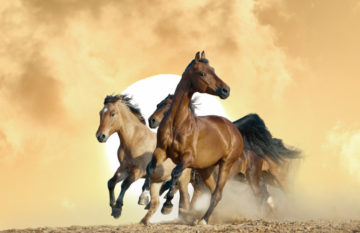
At work, school, home, and in wider community settings, dealing effectively with challenging people is a skill that few of us develop accidentally. For this reason, author and equine-facilitated learning pioneer Linda Kohanov developed in-depth trainings that draw on her experiences rehabilitating the dangerous, formerly abused stallion Midnight Merlin. Linda shares the hurdles she overcame and the surprising insights she gained working with a horse who initially threatened her life. In the process, she shows how these principles can be used to handle challenging people and situations. This work is for anyone who wants to learn new ways to transform interpersonal conflict, power struggles, bullying, and other difficulties at home, school, work, and in political, religious, or social activism contexts. Linda will also reveal the astonishing gifts behind Merlin’s volatile demeanor, gifts that could only be accessed through a counterintuitive approach to power.
“Merlin’s sons showed the same proud, highly sensitive, occasionally explosive yet immensely intelligent disposition their father exhibited,” she says, “traits that don’t respond well to cookie-cutter, dominance- submission techniques. By using the empowered, compassionate approach I learned from Merlin, my staff and I were able to avert many of the difficulties that would have led this younger generation down the same path of violence and rage that Merlin experienced.” Linda shows how these principles can be translated to human situations where working with frightened, aggressive, abused, or potentially explosive children and adults requires a courageous, non-predatory approach to power.
The Power of the Herd Advanced Intensive is for those who have previously attended The Power of the Herd, Balance of Power, or Harnessing the Invisible workshops. Limited to four participants, this in-depth intensive offers the opportunity to gain fluent use of the Power of the Herd Guiding Principles and the Five Roles of a Master Herder in working with increasingly dominant horses, and how to translate these skills into the human world to gain the cooperation and respect of aggressive or resistant employees, bosses, children, spouses, and community members.
There are still two spaces left in the upcoming Power of the Herd Advanced Intensive, which takes place February 3 to 6, 2017.
For those who have not yet attended a pre-requisite for this advanced intensive, The Power of the Herd introductory workshop February 10 to 13 also has some spaces available. For a description see http://eponaquest.com/workshop/power-herd-working-eponaquests-horses-master-five-roles/.
The Power of the Herd Advanced Intensive builds on the leadership, and emotional and social intelligence skills featured in the introductory workshops mentioned above. You will practice the verbal techniques and nonverbal body language that allows you to work more effectively with naturally dominant people and animals. You will also learn how to employ all five of the Master Herder roles in a fluid language of interventions that help groups of people to work more effectively together.
 In her latest book, The Five Roles of a Master Herder, Linda discusses the importance of learning when and how to use the dominant role properly for its life-enhancing benefits, and what happens when people either overemphasize or abdicate this role. The following excerpt from Chapter Five, “Direct and Protect: Dominance without Malice,” communicates the challenges and the benefits of employing this role well:
In her latest book, The Five Roles of a Master Herder, Linda discusses the importance of learning when and how to use the dominant role properly for its life-enhancing benefits, and what happens when people either overemphasize or abdicate this role. The following excerpt from Chapter Five, “Direct and Protect: Dominance without Malice,” communicates the challenges and the benefits of employing this role well:
Whether you overemphasize or avoid the Dominant role, learning to employ it consciously and judiciously is one of the most important—and difficult—skills to develop. A mature, well-balanced executive, community leader, or parent uses this assertive energy to direct others toward common goals, set boundaries, keep youngsters and adults out of trouble, motivate resistant individuals, break up fights, and protect the group from predators.
In working with large animals, master herders also cultivate a sophisticated knowledge of dominance to handle the flamboyant power plays that aggressive herd members engage to challenge authority and intimidate others into submission. Similarly, parents and teachers must help naturally dominant children modulate and channel this sometimes-explosive force into benevolent pursuits.
F or anyone who deals with troubled teens, proficiency in the dominant role is essential. Coaching all adolescents—from bullies to shyer, more sensitive students—in how to develop a mature approach to dominance is one of the greatest gifts that anyone who works with young people can give to future generations.
or anyone who deals with troubled teens, proficiency in the dominant role is essential. Coaching all adolescents—from bullies to shyer, more sensitive students—in how to develop a mature approach to dominance is one of the greatest gifts that anyone who works with young people can give to future generations.
Here’s the problem: Managing, let alone working for or living with people who over-identify with the dominant role is sometimes emotionally painful, other times intensely frustrating, and occasionally even dangerous. Teaching unbalanced alphas to use their power wisely requires considerable focus, courage, and finesse. In these efforts, you must not only be powerful yourself, you must also model a centered, socially conscious use of this often-misdirected force—even if dominance is not your natural inclination. And if dominance is your native tongue, you must transform your own instinctual tendencies to control, intimidate, divide and conquer into an impeccable source of refined influence. Either way, it may be the challenge of a lifetime.
To register for The Power of the Herd Advanced Intensive or The Power of the Herd introductory workshops: http://eponaquest.com/workshop-registration/ or call the Eponaquest office at 520-455-5908.
To read more about productive ways to work with dominant people and animals, as well as how to develop a compassionate, balanced approach to leadership, see The Five Roles of a Master Herder: A Revolutionary Model for Socially Intelligent Leadership at https://www.amazon.com/Five-Roles-Master-Herder-Revolutionary/dp/1608683389/ref=sr_1_1?s=books&ie=UTF8&qid=1484167995&sr=1-1&keywords=the+five+roles+of+a+master+herder.